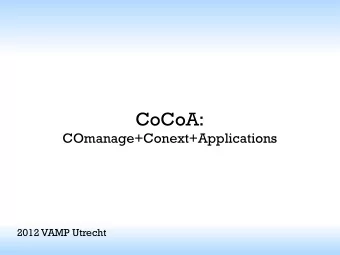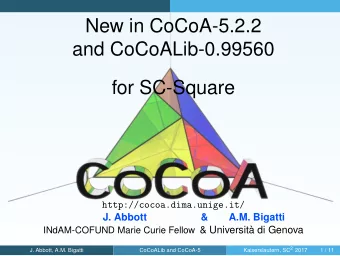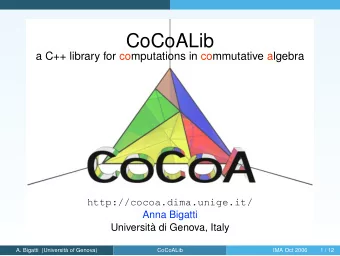
docopt Usage: cocoa new <path> [--theme=<THEME>] cocoa - PowerPoint PPT Presentation
writing better command-line interfaces with docopt Usage: cocoa new <path> [--theme=<THEME>] cocoa build [--continuous] cocoa serve [--host=127.0.0.1] [--port=9000] cocoa (-h | --help | --version) #!/usr/bin/env python
writing better command-line interfaces with docopt
Usage: cocoa new <path> [--theme=<THEME>] cocoa build [--continuous] cocoa serve [--host=127.0.0.1] [--port=9000] cocoa (-h | --help | --version)
#!/usr/bin/env python """ Usage: cocoa new <path> [--theme=<THEME>] cocoa build [--continuous] cocoa serve [--host=127.0.0.1] [--port=9000] cocoa (-h | --help | --version) """ import argparse parser = argparse.ArgumentParser(prog='cocoa') parser.add_argument('--version', action='version', version='1.2.0rc1') subparsers = parser.add_subparsers() parser_init = subparsers.add_parser('new') parser_init.add_argument('<path>') parser_init.add_argument('--theme') parser_build = subparsers.add_parser('build') parser_build.add_argument('--continuous') parser_serve = subparsers.add_parser('serve') parser_serve.add_argument('--host', default='127.0.0.1') parser_serve.add_argument('--port', default=9000) print(parser.parse_args())
“ If you have to refer to the documentation every time you use a module, find (or build) a new module — Kenneth Reitz
#!/usr/bin/env python """ Usage: cocoa new <path> [--theme=<THEME>] cocoa build [--continuous] cocoa serve [--host=127.0.0.1] [--port=9000] cocoa (-h | --help | --version) """ from docopt import docopt print(docopt(__doc__, version='1.2.0rc1'))
#!/usr/bin/env python """ Usage: cocoa new <path> [--theme=<THEME>] cocoa build [--continuous] cocoa serve [--host=127.0.0.1] [--port=9000] cocoa (-h | --help | --version) """ from docopt import docopt print(docopt(__doc__, version='1.2.0rc1')) {'--continuous': False, '<directory>': None, '--help': False, 'build': False, '--host': '0.0.0.0', 'init': False, '--port': None, 'serve': True, '--theme': None, '--version': False }
Usage: cocoa new <path> [--theme=<THEME>] cocoa build [--continuous] cocoa serve [--host=127.0.0.1] [--port=9000] cocoa (-h | --help | --version)
Usage: cocoa new <path> [--theme=<THEME>] cocoa build [--continuous] cocoa serve [--host=127.0.0.1] [--port=9000] cocoa (-h | --help | --version)
A tool for building static websites. Usage: cocoa new <path> [--theme=<THEME>] cocoa build [--continuous] cocoa serve [--host=127.0.0.1] [--port=9000] cocoa (-h | --help | --version) Options: --version show the program's version number -h --help show this help message --theme=<THEME> name of the site theme to use --continuous watch the site directory and rebuild on changes --host=<HOST> hostname to bind to; use 0.0.0.0 to serve globally --port=<PORT> port to run on
Usage: my_program command --option <arg> my_program [<optional-arg>] my_program --another-option=<with-arg> my_program (--either-this| --or-that) my_program <repeating-arg> <repeating-arg> ...
C Julia C# Lua C++ Nim Clojure PHP CoffeeScript Python D R F# Ruby Go Rust Haskell Scala Haxe Swift Java TCL
<?php $doc = <<<DOC A tool for building static websites. Usage: cocoa.php new <path> [--theme=<THEME>] cocoa.php build [--continuous] cocoa.php serve [--host=127.0.0.1] [--port=9000] cocoa.php (-h | --help | --version) Options: --version show the program's version number -h --help show this help message --theme=<THEME> name of the site theme to use --continuous watch the site directory and rebuild on changes --host=<HOST> hostname to bind to; use 0.0.0.0 to serve globally --port=<PORT> port to run on DOC; require('path/to/src/docopt.php'); $args = Docopt::handle($doc, array('version'=>'Cocoa 1.2.0rc1')); foreach ($args as $k=>$v) echo $k.': '.json_encode($v).PHP_EOL;
http://docopt.org
Recommend
More recommend
Explore More Topics
Stay informed with curated content and fresh updates.























